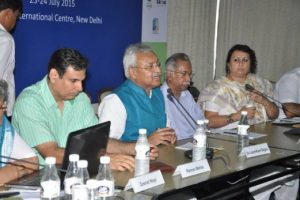National Consultation on Adatation and Disaster Resilience in India’s INDC
Recommendations from National Consultation on
Adaptation and Disaster Resilience in India’s Intended Nationally Determined Contributions (INDC)
Recommendations from the national consultation are :
- India needs to follow a development path that avoids both unnecessary greenhouse gas emissions and ensures that it is on track to achieve sustainable development goals.
- India’s Intended nationally designated contributions (INDCs) for adaptation to climate change must focus on empowering the poorest and vulnerable people with viable local adaptation strategies.
- Empowering women and poor is critical as they have lesser resources, opportunities and authority but are more actively dependent upon and involved in managing natural resources.
- There are several viable and scalable adaptation strategies for rural and urban poor. Government and non-government agencies need to explore on the ways and means to build on each other’s knowledge and experience in India’s INDCs.
- Appropriate institutional mechanism need to be laid out so as to enhance convergence between various institutions in climate change adaptation (CCA) and Disaster risk reduction (DRR) at the local level.
- MoEFCC must work closely with the National Disaster Management Authority (NDMA) to have coherent planning, implementation and monitoring processes while linking adaptation goals, the proposed Sustainable Development Goals and the newly agreed Sendai Framework for Disaster Risk Reduction (SFDRR) targets.
- Adaptation in India needs to build on its rich experience of implementing Disaster preparedness work across the country at the district and sub-district levels.
- India’s INDC will be informed by the efforts made by civil society groups to spread awareness, mobilise local communities, identify and pilot local adaptive possibilities, build local synergies between different actors and enable constructive engagement with local governance systems
- Existing models in the field especially dealing with the impacts of climate change on agriculture-related livelihoods and water security need to be scales up.
- The benefits of existing policy framework for development, disaster risk reduction and availability of growing pool of state-of-the-art technologies for adaptation need to reach the poor and vulnerable people. The enabling environment needs to be combined with decentralised, inclusive governance system and the tradition of indigenous knowledge and locally-appropriate technology.
- The recent decision to quadruple the corpus of National Adaptation Fund (NAF) indicates India is taking action even as the world is still operationalising the newly created Green Climate Fund. This strategy puts India in good stead to add strength to the demand of developing & least developed countries that the developed world must act and give due attention to adaptation and dealing with disaster risks.
Download the Press Release from here.





